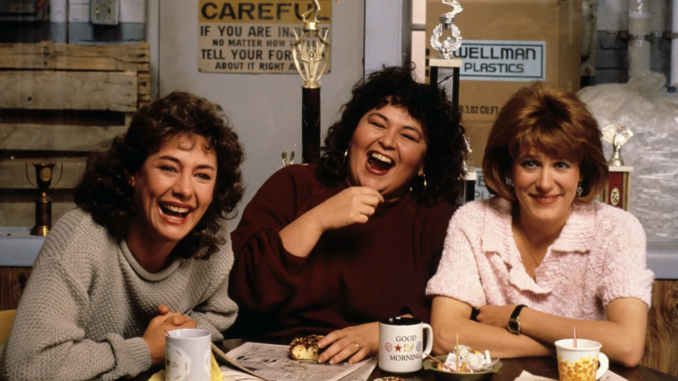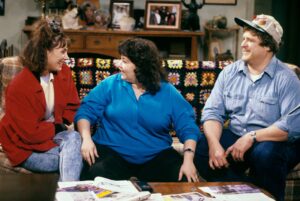
Roseanne is not a sitcom with cardboard cut-out characters; absolutely not about filling out TV stereotypes. There’s no wacky neighbor, there are no contrived plots. As much as I love Seinfeld, too many shows since have relied on having stories generated by its characters’ selfishness. Further, it’s not even until a much later season that Roseanne trots out a “boys and girls compete” episode, a well that even really great sitcoms go to multiple times in any given year.
Roseanne doesn’t have to do these things very much because it is primarily about the fundamental question of, how will this family get along? No story must be concocted, because the characters are too busy actually living daily life, not to mention doing it hilariously. With some sitcoms, we talk in terms of “the one when…” (Friends famously acknowledges this in its episode titles), but with Roseanne, it’s a way bigger framework of emotion, attitude, and chemistry to single out too many single plots whatsoever.

This is all set up remarkably in the pilot, which at first glance doesn’t seem too ingenious, but succeeds because of its sheer ruggedness and authenticity. First moment: A kid gives his mom a knot in his shoe to fix. She ribs him to wear loafers instead. She ultimately fixes the knot and throws it back while telling him to eat his breakfast and not the pie because it’s “contaminated,” all with a kind of warmth but also genuine exhaustion. There’s history with these people. “Don’t spill the milk this time!” she includes.
In a nutshell, we are already shown the biggest ultimate weapons of the series: its wit and its balance between love and soft attack. Then, when the father, Dan, comes in, the picture is complete. The viewer can tell Roseanne lights up, yet they’re immediately and purposefully trading harsh barbs. Roseanne’s suddenly not just a funny central character dealing with her messy family. She thinks herself a martyr, sure, but her family gives back what she throws, as if to say, we know you do a lot, Mom, but get over yourself. It’s telling that Dan gets the first spontaneous applause of the show with his counter-attack of asking for toast when he’s told to stop asking for coffee, which Roseanne has to laugh at, too, in spite of herself.

The power dynamic of the household fittingly opens back up again, though, when Roseanne goes to work. Again, it’s not the typical sitcom bifurcated home and work scenario. At the factory filled with women, Roseanne is still talking only about her home, and we see how Roseanne views it as an individual. When Roseanne’s friend sings Dan’s praises, Roseanne launches into a muffin-aided monologue about how he didn’t come that way–in the end, taking a big bite out of his “male ego.” She sees herself as the wizard behind the curtain, and the truth behind this assertion is left ultimately up to the audience, their fickle applause the prize.
When flighty sister, Jackie, enters, we finally do see a case where Roseanne has a clearer upper hand, although it’s a bitter victory. While the home scene ended with Dan trapping Roseanne into a long, improvised story that ended with a punch line at her expense; here, Roseanne operates the exact same way as Jackie, except it’s not just at her expense, it’s at the expense of her optimism, teasing her about a success seminar. So she may have got the laugh, but also the harder life. In one fell swoop, Roseanne is on top and the bottom at the same time, a place she and the rest of the family will occupy during the remainder of the series (even the controversial last season, wherein a winning lottery ticket only inverts where the top and bottom lie).

Finally, after a trip to her daughter’s school to get a better glimpse of the different ways Roseanne acts with authority (with her boss, brazen; with a dippy teacher, considerably more so), and a nice pilot motto to embroider on a pillow (“Our whole family barks”), Roseanne goes home at the end of the day to find confirmation of her muffin-alogue. Dan hasn’t done what he promised by fixing the sink, while she has done everything. Or has she? They have a more serious, passionate fight. Dan is incensed. Roseanne’s had enough. The morning looks one way, the night looks another in this house, we see.
Soon enough, after a daughter’s injury, the two come to a truce. But the barbs and accusations still ring in our ears. They were funny. They were painful. They were true. Is it all worth it in the end? Mostly, but both characters at the core seem unsure. Fortunately, we have next week to think and joke about it some more.

In this episode, D.J. is played by Sal Barone but the role of D.J. was quickly recast after the first episode because the producers wanted someone younger.
The original opening sequence consisted of the Conner family eating dessert.
Laurie Metcalf wore a curly-haired wig so that she could look more like Roseanne’s actual sister.
“Life and Stuff” was also the working title of the series.
The pilot episode features a slightly different title sequence with a different Roseanne logo than the one used throughout the rest of the series.
